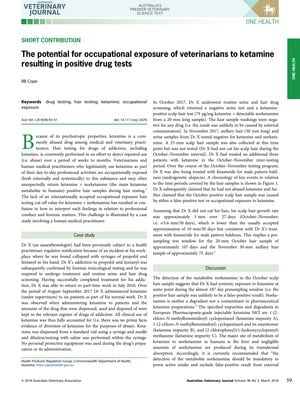The Potential for Occupational Exposure of Veterinarians to Ketamine Resulting in Positive Drug Tests
February 2018
in “
Australian Veterinary Journal
”

TLDR Veterinarians could test positive for ketamine from work exposure, not just substance abuse.
The document examined the risk of veterinarians and medical practitioners testing positive for ketamine on drug tests due to occupational exposure rather than substance abuse. It focused on a case study involving Dr. X, an anesthesiologist with a past of substance abuse, who tested positive for ketamine on a scalp hair test but negative on urine and axillary hair tests after returning to work. This discrepancy suggested that the positive hair test might have resulted from occupational exposure. The study underscored the absence of a universally recognized cut-off value for ketamine exposure in the workplace, which makes interpreting drug test results challenging. The conclusion drawn was that veterinarians and medical practitioners could absorb ketamine systemically through occupational exposure, and the high sensitivity of modern drug testing could lead to false positives. The document recommended that veterinarians be cognizant of the risk of accidental exposure to addictive drugs used in their field.



